Plumerias are beautiful ornamental flowers. Growing them can be a little tricky if you don't know the kind of soil in which to plant them. If that's the case, don't worry! We did the research and found out the best ground and growing conditions for plumeria!
The best soil for a plumeria to thrive in is slightly acidic, ideally around 6.0 to 6.8 pH level. Plumerias do not enjoy heavily watered soil as their roots may rot when sitting in it.
It would help if you also looked for fertilizers with high amounts of phosphate to keep them happy and healthy.
Plumerias bloom under all the conditions mentioned, but keeping them well takes more than that. The key is in the details! In this post, we provided tips for their growing condition and maintenance. With that said, let's dive right in!
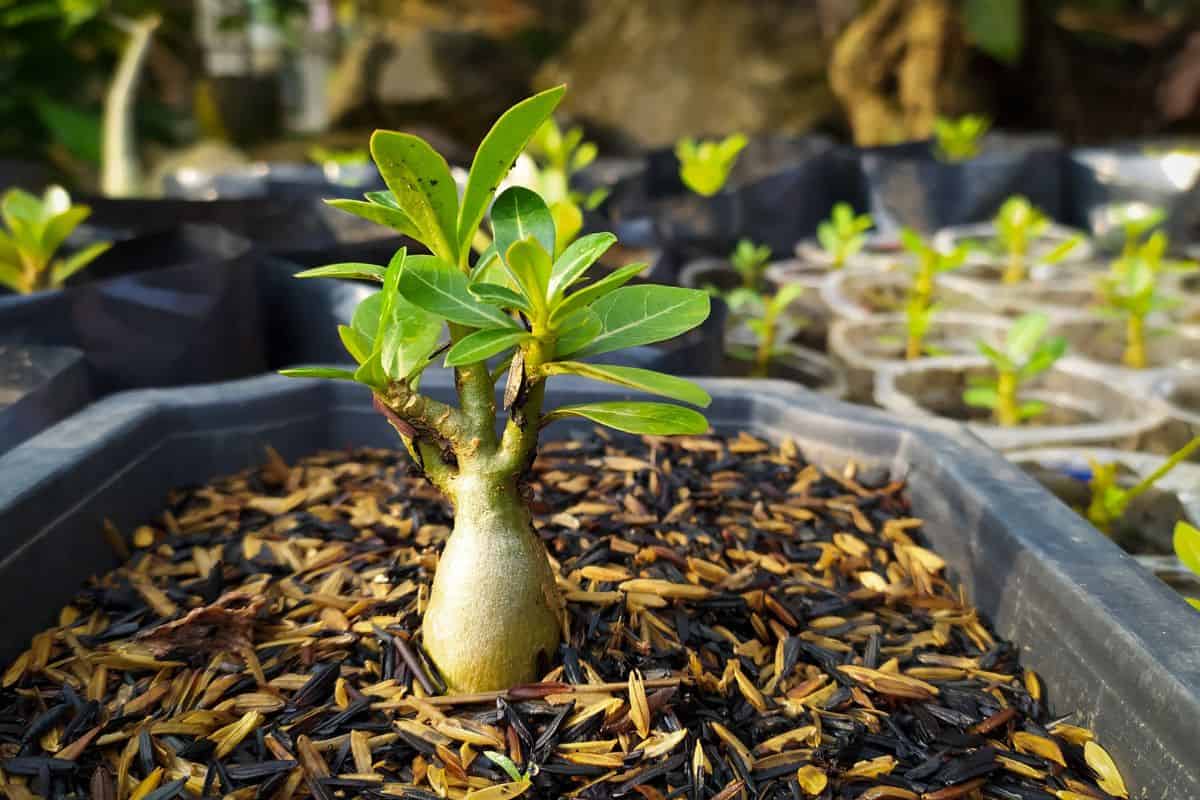
What Is The Best Soil For Plumeria?
If you're planning to grow plumeria in your garden or lawn, or if you already have one, you must keep four things in mind regarding the soil: acidity, drainage, water retention, and additives.
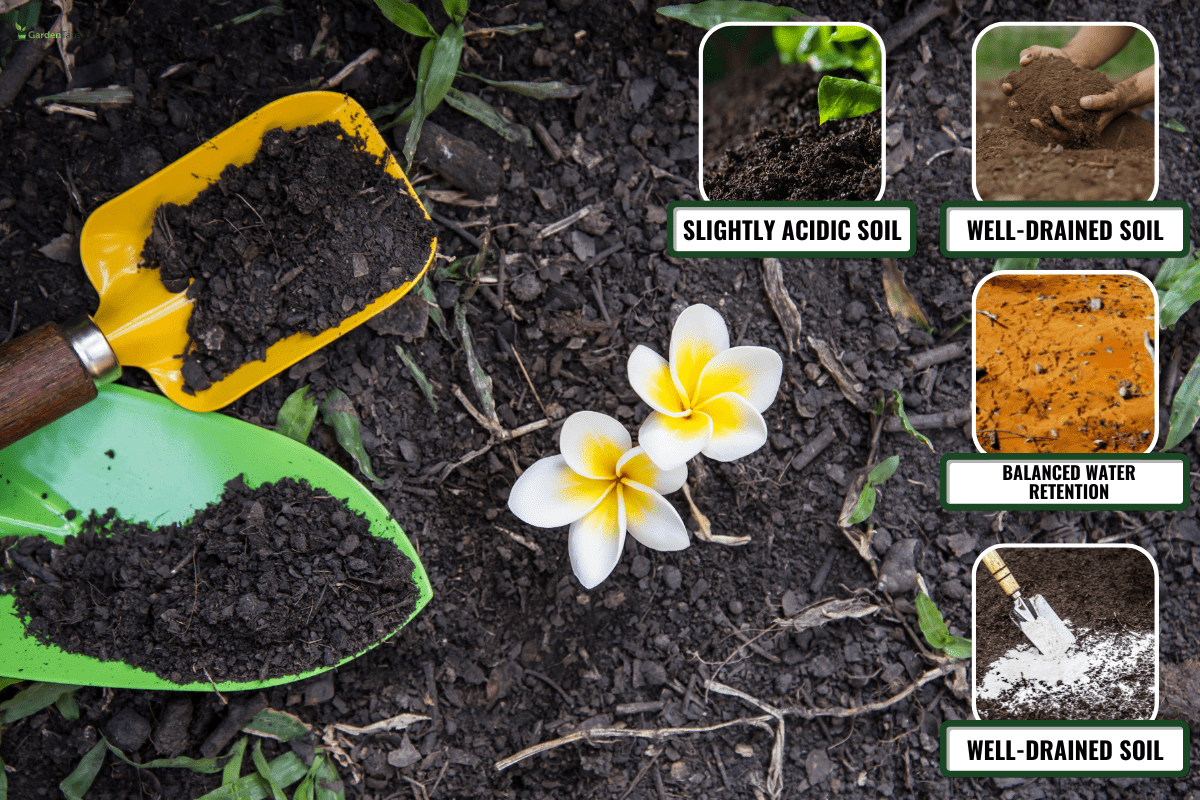
Slightly Acidic Soil
Plumerias belong to the cactus family. This is why the type of soil it will be planted in is essential. Loose and well-drained soil should be kept in mind when growing plumerias.
Ideally, a slightly acidic soil with a 6.0-6.8 pH level is conducive because it's well-draining, loose, and contains plenty of organic matter. Stray away from sandy soil since it is too loose and drained, which may cause dehydration to the plant.
But that's not all when it comes to acidity. Ensure that you maintain the acidity within the 6.0 to 6.8 range. If you don't, your plumeria may lack the nutrients and hydration they need to thrive.
To do this, have your soil pH tested regularly. Testing kits should be available in stores and online.
Check out this pH tester on Amazon.
If you find out that your soil is too acidic, you can correct it by adding agricultural lime to make it more alkaline. But if it has gone neutral or alkaline, you can always add coffee grounds, compost, and sulfur compounds.
Always keep the acidity level in mind because this is where all the other elements in keeping your plumeria alive come into place.
Well-Drained Soil
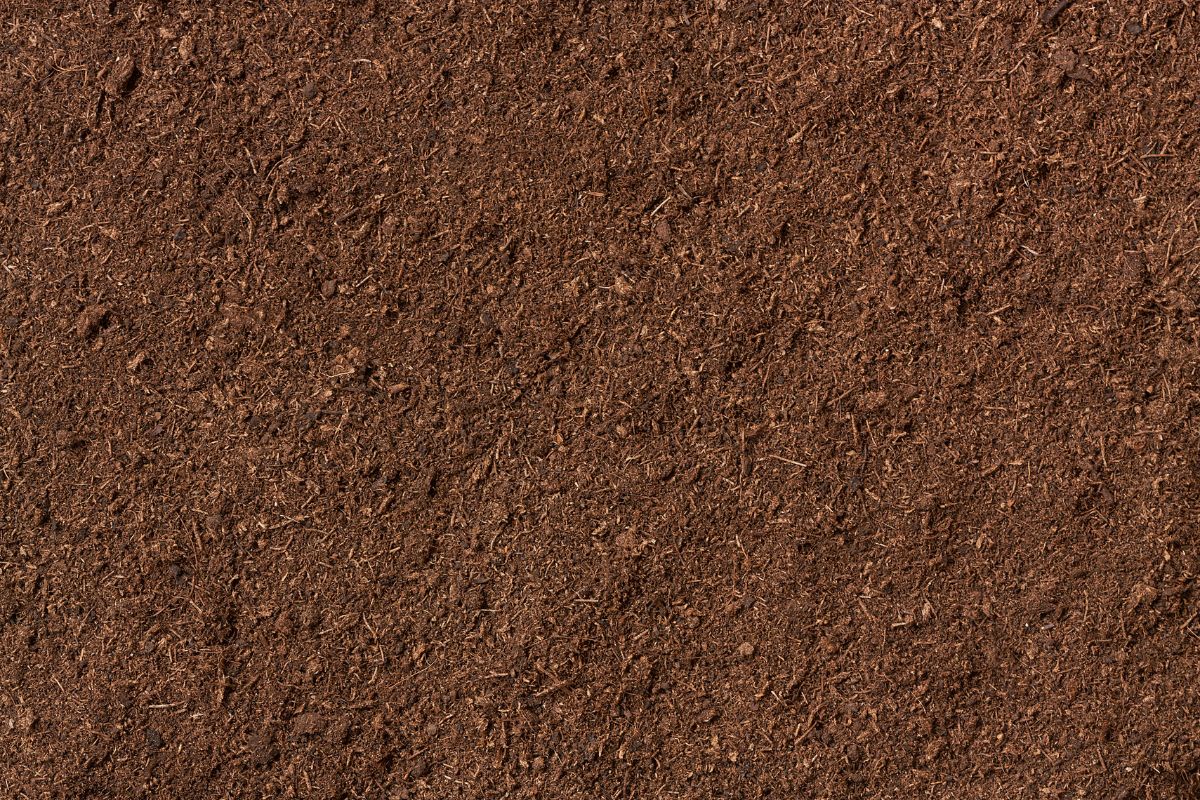
Keeping your soil well-drained would work wonders for your plumeria. Like most tropical flowering plants, plumerias do not like sitting in water. Pick a compost that will result in well-draining soil.
This wouldn't be an issue if your garden soil is already loamy and has the right acidity level. But if it isn't, you will need to add drainage to the ground using vermiculite, sand, or grit.
Using vermiculite or perlite for plumeria helps compost drainage and adds more alkalinity to your soil. Both can be additives, but perlite is a better option because it's not reactive.
It doesn't retain in the compost, and it's lightweight. Add a ratio of 1 part perlite/vermiculite to 5 parts of potting mix.
Remember not to water your plumeria during the winter, as it won't be able to soak up nutrients.
Read this post, "Vermiculite Vs. Perlite Vs. Pumice: Pros, Cons, And Differences," to learn more.
Balanced Water Retention
Water retention plays a significant role in the texture of soil for plumerias. As mentioned, plumerias do not enjoy sitting in overly damp ground.
Because of this, plumerias shouldn't be planted in clay soils or any heavy soil. If so, you will need to amend the soil using sand, pumice, peat moss, grit, or pumice to improve its water retention.
While yes, plumerias are fond of dry conditions, they still need some water retention to keep them together. Cactus potting mix contains a water-retaining formula to avoid over-watering.
When your soil is moist to the touch, avoid watering the plant. Having a balance in water retention and drainage will keep your plumerias healthy.
With Soil Additives
Most garden soils have low phosphate levels, making a very acidic environment for your plumeria to thrive. To fix this, add bone meal or rock phosphate as an additive: no need to do this if your soil leans on the neutral or alkaline side.
Additives play a significant role in keeping your soil well. If you don't use the right amount of additives, your soil may become too acidic: causing the plumeria roots to burn and the leaves to dry.
If it leans too alkaline, the plant wouldn't be able to break down nutrients.
You might think it's alright to plant your plumeria directly in your garden because your other plants could thrive and bloom. But the thing is, plumeria has different needs.
If you think most garden soils have a pH of around 8, it will be tough to grow your plumeria unless you use some additives.
What Soil Additives Are Best For Plumeria?
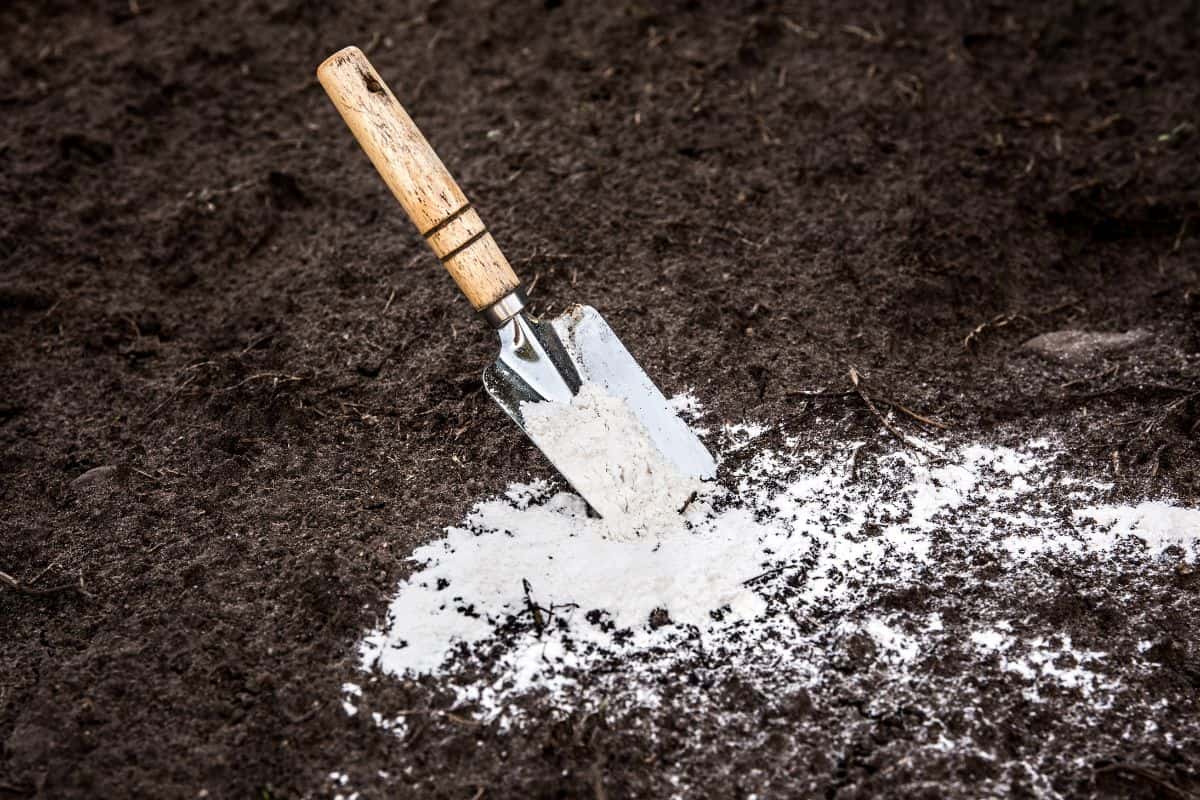
Here are some types of compost and additives which you can use for your soil for plumerias to thrive in:
Garden Compost
Garden compost is the most commonly used compost in the garden. But for plumeria, you might want to think twice. Garden compost has excellent water retention capabilities; however, it leans more alkaline than acidic.
So, if you already have a pH level of 8 soil and use garden compost for your plumeria, you won't meet the acidity level requirements needed for a plumeria to thrive.
This will result in overhydration and less fertilization, and you'll end up with yellow, dry leaves that can't hold themselves.
Leaf Compost
Leaf compost or mold is an excellent substitute for garden compost. It's very easy to make and has a lower pH (6.3) than garden compost.
Gather your leaves in the autumn, and they will be ready next year. It will turn dark and have a consistency similar to loam. Although the acidity is on the lower end, it's still an excellent additive for your soil.
Ericaceous Compost
Ericaceous compost is excellent for those looking to pot their plumeria.
Although it has around 4-5 acidity levels, which is very acidic, you can mix 10% of ericaceous compost with potting compost.
This cancels out the acidity, which is perfect for your plumeria plant.
Cactus Potting Mix
Cactus potting mix is one of the best additives you can use on your soil. It's got just the right pH level (around 5 and 6). It doesn't retain much water and has excellent drainage.
Using a cactus potting mix will make your soil similar to plumeria's native environment.
Check out this cactus potting mix on Amazon.
How To Take Care Of Your Plumeria Plant
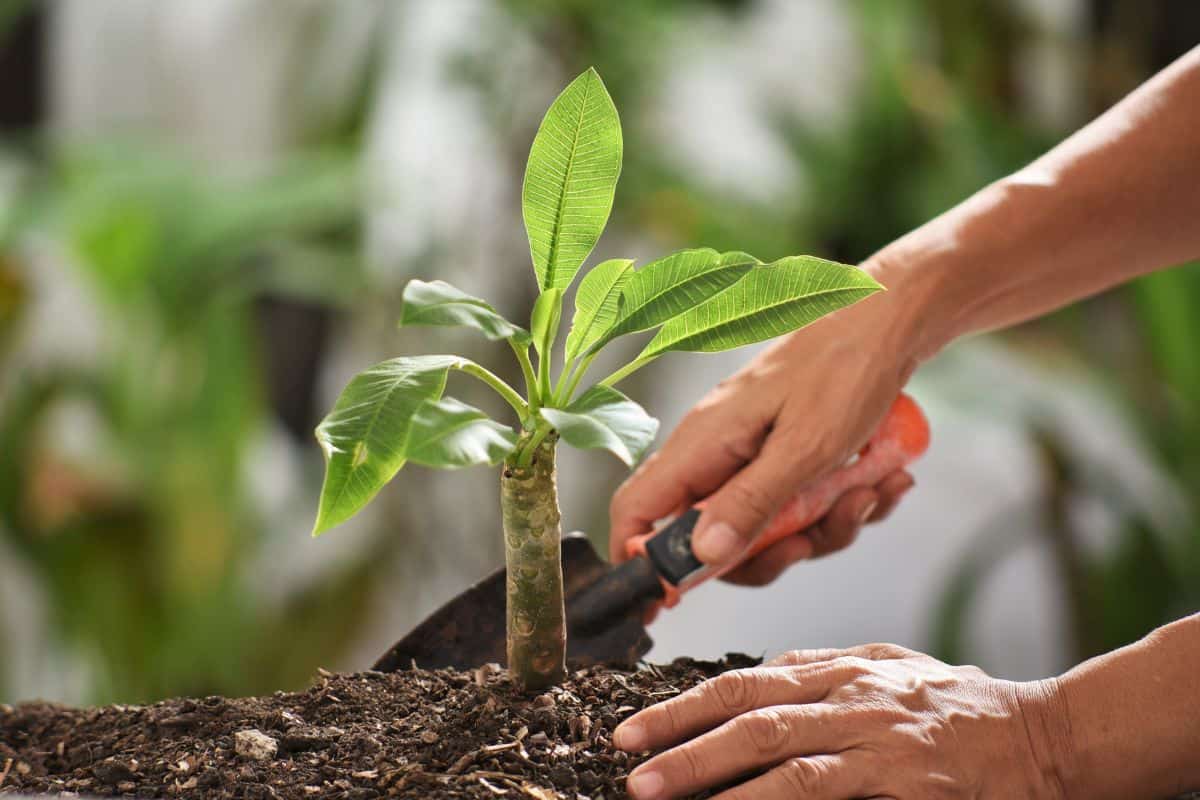
To keep your plumeria plant healthy and happy, there are other elements you need to look out for other than the type of soil it grows from.
Plumerias quickly grow when it gets all the sunlight it needs. They need at least 6-8 hours of direct sunlight to thrive.
They grow well in USDA zones 10-12 and do not tolerate cold temperatures. Keep your plumeria indoors if there's a seasonal change in your area. Allow at least 4-6 hours of direct sunlight to let it thrive.
Plumerias do not need that much pruning. Ideally, you should only prune them around early spring before they leaf out. Keep your pruning low because plumerias are prone to wounds that might rot.
Things To Watch Out For On Plumerias
Plumerias aren't that much prone to pests and diseases, but you need to keep an eye out for the following:
Rust
Reddish pustules may develop at the back of the leaves. Remove the affected leaves to prevent the spread. Use a fungicide afterward.
Powdery Mildew
Powdery mildew is a common issue for most plants. Remove white mold on leaves to increase air circulation. A fungicide can help fix this issue.
Spider Mites
These mites look like tiny spiders that will cause the leaves to become yellowish. Remove the infected leaves and hose them with water and insecticidal soap.
To Wrap It Up
Plumerias are tropical plants. If they're not grown in their native environment, you'll need to find a way to keep them thriving.
Keep your soil slightly acidic and well-drained. It's also important to watch out for your soil's water retention because plumerias aren't fond of dirt soaked in water.
Using additives like phosphate and potting mix will also work for your plumeria!
And while we have your attention, check out these related articles:


